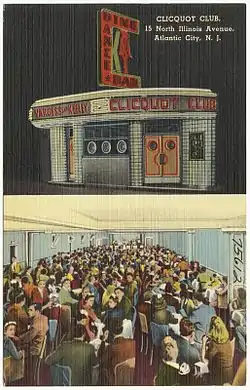Clicquot Club
Clicquot Club was a nightclub at 15 North Illinois Avenue[lower-alpha 1] in Atlantic City, New Jersey, in the heart of the city. Billed as the club that "never closed",[2] it became notorious as an illegal gambling spot in the city.[3]
 | |
 Clicquot Club Location in Atlantic City | |
| Address | 15 North Illinois Avenue Atlantic City, New Jersey United States |
|---|---|
| Coordinates | 39°21′38″N 74°25′56″W |
| Type | Nightclub |
History
Operating during the Prohibition era in the 1920s, the club provided both illegal liquor and illegal gambling.[3] The bar and cabaret were considered "feeder rooms" to bring people to the profit-making roulette wheels, craps tables, and card games in the backrooms.[4] A news item in December 1931 reported a raid on the club in which Federal agents removed $20,000 worth of lavish Japanese and Chinese furnishings from the 20-room mansion and "poured several thousand dollars worth of alleged whiskies and champagnes down a drain".[5]
The bar and cabaret also developed a reputation for lawlessness, as the Clicquot became known as one of the "bust-out joints" for Philadelphia convention-goers eager to "release their inhibitions as they experienced everything and anything available".[6][7] Until 1951, when the Kefauver Committee mounted an "anti-hostess campaign", the Clicquot used its waitresses to push drinks on guests and even offer to sit and drink with them, in violation of New Jersey's alcoholic beverage control laws.[8]
The cabaret underwent a series of management changes in the 1940s. In March 1942 Max Cohen assumed management of the cabaret.[9] In February 1943 Cleo Valenteene, a former burlesque and nightclub dancer, became manager,[10] followed by performer Nan DeMar in July 1943.[11] In December 1950 Michael J. Keeley became the owner-operator.[12][13]
Shows
The Clicquot Club has been called "the leading white nightclub" in Atlantic City.[14][15] In 1945 popular black bandleader Mandy Ross was booked into an engagement at the club, and a white vocalist refused to perform with the band.[15] In 1946, Eleanor Sherry and Her Swinghearts performed at the club.[16] The cabaret often booked revues, including the 1946 Nan DeMar revue[17] and a 30-performer revue in 1948.[18] Eddie Kaplan was responsible for booking acts to perform at the club in the late 1940s.[18][19][20] In 1947 drink prices started at 90 cents at the Clicquot Club, Paddock International, and Club Harlem.[21]
Notes
- Illinois Avenue no longer exists. It was renamed Dr. Martin Luther King Boulevard in 1988.[1]
References
- "Illinois Ave. is no more in Atlantic City". The Free-Lance Star. Associated Press. 16 January 1988. p. 38.
- "Matchbook from the Clicquot Club saying it "never closed"". Archived from the original on 14 August 2016. Retrieved 14 August 2016.
{{cite web}}: CS1 maint: bot: original URL status unknown (link) - Kennedy & Waltzer 2004, p. 92.
- "Peter Moruzzi's Mid-Century". Petermoruzzi.com. 22 May 2011. Retrieved 5 August 2016.
- "Dry Agents Visit Clicquot Club and Silver Slipper; Several Thousand Dollars in Liquor Seized". Cumberland Evening Times. Associated Press. 14 December 1931. p. 8 – via Newspapers.com.

- Anselmo D'Amato 2001, p. 63.
- "Atlantic City Spots Bait Trap For Philly Convensh Overflows". Billboard: 43. 12 June 1948.
- Smith, Bill (25 August 1951). "Misery-By-The-Sea This Season at AC". Billboard: 35.
- "Cohen Takes AC Clicquot". Billboard: 118. 13 June 1942.
- "Valenteene Managing Club". Billboard: 15. 27 February 1943.
- "Atlantic City Comes to Life". Billboard: 15. 17 July 1943.
- "At. City Faces Dull Holiday". Billboard: 44. 16 December 1950.
- "Court Stay for Resort Cabaret". Billboard: 21. 15 March 1952.
- Waltzer, Jim (22 January 2009). "Creatures of the Night". Atlantic City Weekly. Retrieved 10 August 2016.
- Kukla 2002, p. 85.
- "Off the Cuff". Billboard: 33. 19 January 1946.
- "In Short". Billboard: 41. 6 July 1946.
- "Burlesque". Billboard: 30. 19 June 1948.
- "Burlesque". Billboard: 37. 10 July 1948.
- Billboard. 11 September 1948. p. 45.
- "Price War Menaces Atlantic City Clubs". Billboard: 35. 29 March 1947.
Sources
- Anselmo D'Amato, Grace (2001). Chance of a Lifetime: Nucky Johnson, Skinny D'Amato, and how Atlantic City Became the Naughty Queen of Resorts. Down the Shore Pub. ISBN 0945582757.
- Kennedy, Rod; Waltzer, Jim (2004). Monopoly: The Story Behind the World's Best-Selling Game. Gibbs Smith. ISBN 1586853228.
- Kukla, Barbara J. (2002). Swing City: Newark Nightlife, 1925–50. Rutgers University Press. ISBN 0813531160.